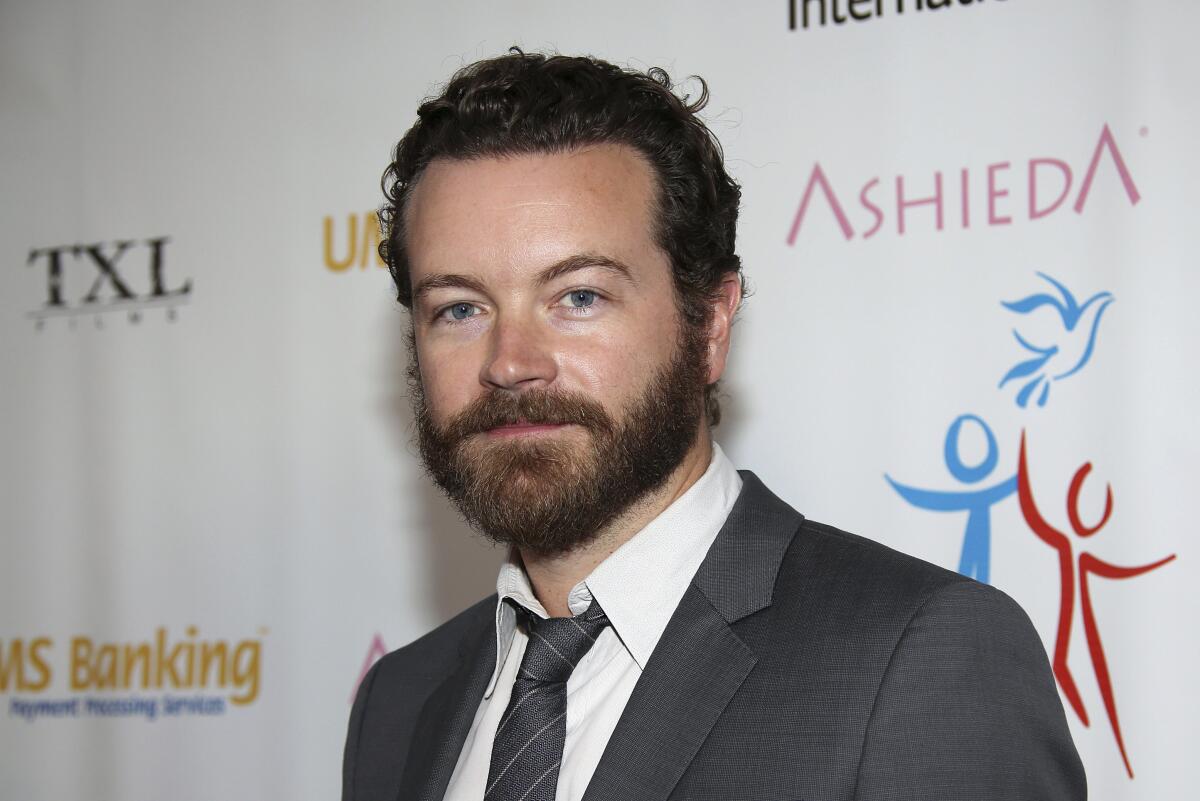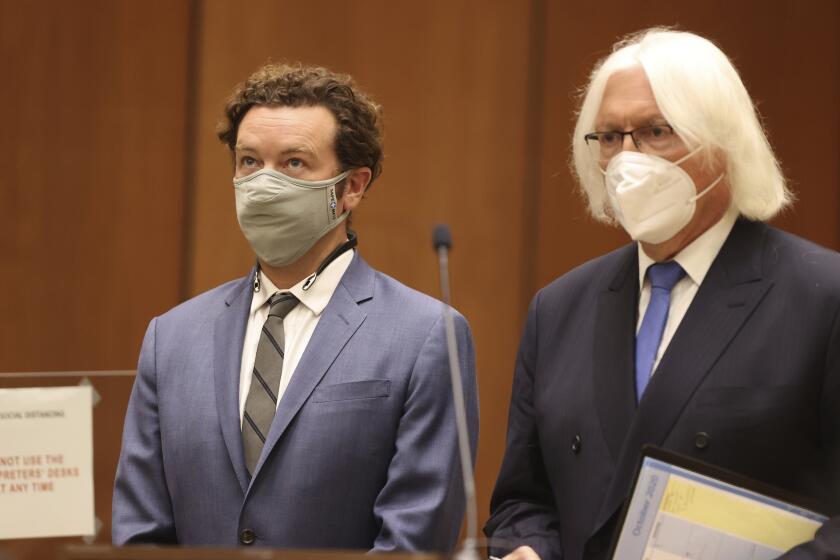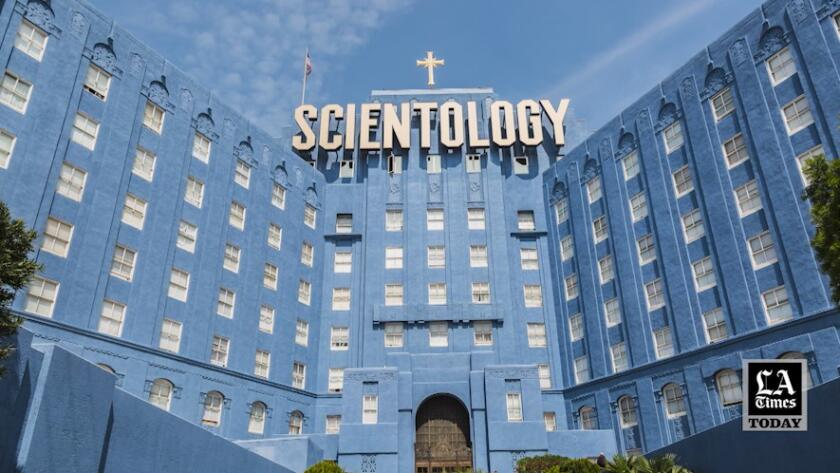Can former Scientologists take the church to court? Or are religious tribunals the only recourse?

- Share via
After Chrissie Bixler told the LAPD that Scientologist and actor Danny Masterson had raped her, strangers showed up at her home, filmed her family and peeked in her windows. Two of her dogs mysteriously died, one by eating meat laced with rat poison. Her security system was hacked. Someone posted ads in her name on Craigslist soliciting men for anal sex.
Bixler made these allegations in a lawsuit, charging that Scientology waged a campaign to terrorize her after failing to dissuade her from reporting Masterson to the Los Angeles Police Department. Other women joined the lawsuit after telling police that Masterson had sexually assaulted them — which he has denied — saying they too had been stalked and placed under surveillance.
But some of the women, including Bixler, formerly belonged to Scientology, and like other members signed agreements to submit any disputes to binding arbitration before a three-member board of practicing Scientologists. California courts are now trying to decide whether the agreements may be enforced and the lawsuit decided by a Scientology tribunal instead of a jury.
The case has brought attention to a practice known as “religious arbitration,” in which Christians, Jews, Muslims and now Scientologists resolve disputes ranging from divorce to real estate to employment outside of a courtroom. The practice has long been upheld by secular courts, which by law cannot interfere with religious doctrinal matters.
In binding religious arbitration, disputes may be decided according to the tenets of a religion. Awards can be appealed to secular courts, which in most cases uphold them.
“No court has ever said that because this form of arbitration is religious, we are going to discriminate against it and not allow it to be enforced,” said Michael A. Helfand, an expert on religious law who teaches at Pepperdine Caruso School of Law.
In addition to the lawsuit, Masterson — who starred in “That ’70s Show” and “The Ranch” — faces a criminal trial. He has pleaded not guilty, and Scientology has denied the women’s charges.
A Los Angeles trial judge and an intermediate state appeals court ruled that the lawsuit had to go to binding Scientology arbitration. The California Supreme Court, which has been skeptical of some arbitration agreements, ordered the Los Angeles-based 2nd District Court of Appeal to reconsider.
In similar cases, Scientology has prevailed, at least so far.
The Times’ series on Scientology ran in 1990 and gave a rare look at the church’s beliefs, practices and history.
Luis Garcia, 63, an Irvine resident and self-employed businessman, sued the church for fraud after he said he donated hundreds of thousands of dollars to the organization over his 28 years as a member. He objected to arbitration, and the case was heard in Florida, the headquarters for Scientology.
Garcia said he had signed dozens of arbitration agreements during many years in Scientology. One was required for each course he took. Garcia said the agreements consisted of several pages and he signed them hurriedly when told to do so before enrolling in paid courses.
A federal trial judge in Florida upheld the agreements under Florida law and ordered him to arbitration, a process he described in detail in a sworn affidavit. He said he was denied a lawyer and prohibited from bringing witnesses and that the church’s chief justice officer refused to allow the board to consider most of his evidence. The Scientology panel dismissed his fraud claims but decided he was entitled to $18,000 check in refunds for deposits he had made for future retreats.
Instead of cashing Scientology’s check, Garcia appealed.
The U.S. 11th Circuit Court of Appeals decided 2-1 this month to uphold the award. The court said Scientology had declared Garcia and his wife “suppressive persons” — a term that refers to people who have been expelled from Scientology — but rejected his claim that suppressive persons could not obtain a fair hearing from the church.
By signing the papers pledging to arbitrate, “the Garcias agreed to a method of arbitration with inherent partiality and cannot now seek to vacate that award based on that very partiality,” Judge Robert A. Luck, a Trump appointee, wrote for the majority.
The dissenting judge said the arbitration agreements referred to Scientology procedures, but none existed at the time the Garcias signed them. Indeed, the judge said, Scientology made up the procedures for Garcia’s case, giving the church an unfair advantage.
“You can’t make up the rules as you go along,” wrote Judge Robin S. Rosenbaum, an Obama appointee. “It’s a basic concept of fairness.”
Garcia can ask a larger panel of the 11th Circuit or the U.S. Supreme Court to reconsider the case. He said his lawyers have not yet decided how to proceed.
On the same day the 11th Circuit decided the Garcia case, the three-judge panel on California’s Los Angeles-based Court of Appeal held a hearing to reconsider its previous 2-1 decision on the Masterson lawsuit.
One of the justices repeatedly questioned why the court should not just allow the arbitration to proceed and then decide whether it was legally sound. The decision by the appeals court, due within 90 days of the hearing, may be appealed back to the California Supreme Court.
If courts determine the Scientology agreement must be enforced, the women could still appeal the panel’s ultimate decision. But once an arbitration panel makes a binding decision, courts are limited in their ability to overturn it.
Courts also are legally obligated to favor arbitration agreements under the federal Arbitration Act of 1925. But state law determines the contours of the law, and California has been less protective of the pacts than many other states.
“California judges are just more skeptical of arbitration,” said Helfand, citing statistical studies.
Women who have accused Danny Masterson of rape testified that Scientology officials tried to stop them from reporting the alleged attacks to police.
Helfand, who has served as a Jewish arbitrator, said he was troubled that Scientology had not spelled out its arbitration procedures in advance of holding arbitrations. He also believes courts might be able to refuse to enforce the church’s arbitration agreements on the grounds they call for Scientologists “in good standing,” a description that secular courts are barred by the 1st Amendment from interpreting.
Ken Sande, a Montana resident who has a law degree and whose father was a trial judge, has overseen Christian arbitration. Its goal, he said, is partly to achieve reconciliation and to leave both parties satisfied. Someone who simply wants the highest amount of monetary damages, he said, is better off going to a public court. He said Christian arbitration also strives to ensure that both parties are satisfied with the arbitrators.
Critics of religious arbitration have argued that the forums often deprive litigants of the full protection of the law. The 1st Amendment’s protection of religious liberties prevents courts from giving religious arbitration the same scrutiny as its secular counterpart, argued Terrina LaVallee in 2020 in the Georgetown Journal of Legal Ethics.
She noted that in some Orthodox Jewish communities, a person can face being ostracized for refusing to arbitrate a dispute in a religious proceeding.
She cited a court decision upholding an arbitration agreement that threatened those who refused to sign with a seruv, even though the court described it as a “a prohibitionary decree that subjects the recipient to shame, scorn, ridicule and public ostracism by other members of the Jewish religious community.”
Whether people signed arbitration agreements under duress must be evaluated on a case-by-case basis, said Helfand. “I think courts don’t do a good job on that front,” he said.
Helfand said that in some cases, plaintiffs may fare better under Jewish law than secular law. He cited cases of teachers for religious schools who sue after being fired. American courts bars such lawsuits under a ministerial exception in the law. Jewish law allows teachers in religious schools to collect awards.
Michael J. Broyde, a law professor at Emory University who also has served as a Jewish arbitrator, noted that “religious communities have the right to determine who are going to be their members.”
“The real question to ask about Scientology arbitration is do people knowingly sign or do people just sign in passing without giving the matter any thought?” he asked.
William Forman, a lawyer for Scientology, said its arbitration agreements ensure “people know what they are signing up for.”
“The Scientology agreements are not treated any differently than other agreements which are routinely enforced,” Forman said.
- Share via
Watch L.A. Times Today at 7 p.m. on Spectrum News 1 on Channel 1 or live stream on the Spectrum News App. Palos Verdes Peninsula and Orange County viewers can watch on Cox Systems on channel 99.
More to Read
Sign up for Essential California
The most important California stories and recommendations in your inbox every morning.
You may occasionally receive promotional content from the Los Angeles Times.













